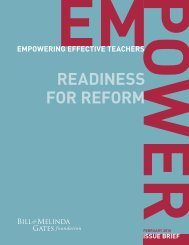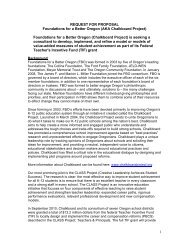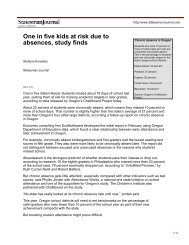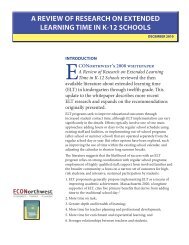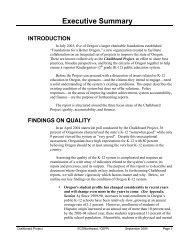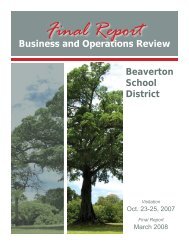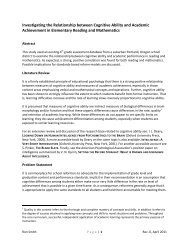Tapping the Potential - Alliance for Excellent Education
Tapping the Potential - Alliance for Excellent Education
Tapping the Potential - Alliance for Excellent Education
You also want an ePaper? Increase the reach of your titles
YUMPU automatically turns print PDFs into web optimized ePapers that Google loves.
TA P P I N G T H E P O T E N T I A L : R E TA I N I N G A N D D E V E L O P I N G H I G H - Q U A L I T Y N E W T E A C H E R Sing door,” where large numbers of qualified teachers depart <strong>the</strong>ir jobs <strong>for</strong> reasonso<strong>the</strong>r than retirement. He also addresses criticisms of those who argue that concernover teacher turnover is exaggerated. The report concludes that teacher recruitmentprograms will not solve <strong>the</strong> staffing problems of schools if <strong>the</strong>y do not also address <strong>the</strong>organizational sources of low teacher retention.Ingersoll, Richard, and Jeffrey Kralik. The Impact of Mentoring on Teacher Retention:What <strong>the</strong> Research Says. Denver, CO: <strong>Education</strong> Commission of <strong>the</strong> States, 2004.This report reviews ten quantitative and evaluative studies with <strong>the</strong> primary objectiveof providing policymakers, educators, and researchers with a reliable assessment ofwhat is known and not known about <strong>the</strong> effectiveness of teacher induction programs.In particular, this review focuses on <strong>the</strong> impact of induction and mentoring programson teacher retention. While <strong>the</strong> impact of induction and mentoring differed significantlyamong <strong>the</strong> ten studies reviewed, collectively <strong>the</strong> studies do provide empiricalsupport <strong>for</strong> <strong>the</strong> claim that assistance <strong>for</strong> new teachers and, in particular, mentoringprograms have a positive impact on teachers and <strong>the</strong>ir retention.At <strong>the</strong> same time, while <strong>the</strong> studies point to <strong>the</strong> likely value of some induction andmentoring programs in decreasing <strong>the</strong> attrition of new teachers, a number of questionsremain concerning mentoring and induction that require more controlled andsystematic research than currently exists:1. What kinds of teachers are helped most by induction and mentoring programs?2. Which elements, supports, and kinds of assistance make induction and mentoringprograms most helpful in addressing <strong>the</strong> various weaknesses among new teacherswith differing backgrounds?3. Which aspects of induction and mentoring programs contribute most to <strong>the</strong>increased retention of new teachers? Do <strong>the</strong>se differ from <strong>the</strong> factors that contributemost to teachers’ enhanced classroom effectiveness?4. Do <strong>the</strong> selection, preparation, training, assignment, and compensation of mentorsmake a difference?5. Is it possible to document links between teacher participation in mentoring andgains in student outcomes?Developing carefully controlled studies to answer <strong>the</strong>se key questions will be crucialto allow policymakers and educators make in<strong>for</strong>med decisions regarding mentoringand induction policies and programs <strong>for</strong> <strong>the</strong>ir schools.Ingersoll, Richard, and Thomas Smith. “Reducing Teacher Turnover: What Are <strong>the</strong>Components of Effective Induction?” Paper presented to <strong>the</strong> American <strong>Education</strong>alResearch Association annual meeting, April 2003.This study examines whe<strong>the</strong>r support, guidance, and orientation programs—collectivelyknown as induction—have a positive effect on <strong>the</strong> retention of beginning teachers.Using data from <strong>the</strong> nationally representative 1999–00 Schools and Staffing Survey(SASS), <strong>the</strong> report focuses on a number of different types and components of induction,including mentoring programs, group induction activities, and <strong>the</strong> provision ofextra resources and reduced workloads. The results indicate that beginning teacherswho were provided with mentors from <strong>the</strong> same subject field and who participated in59



